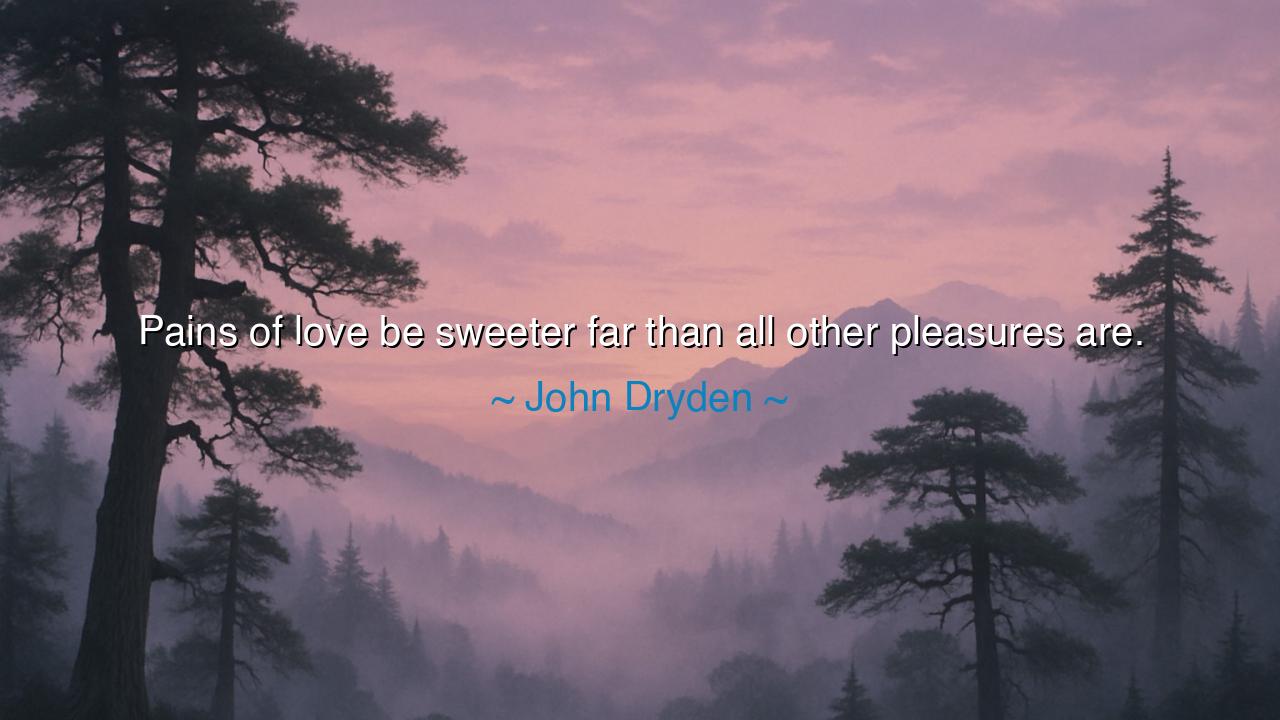
Pains of love be sweeter far than all other pleasures are.






“Pains of love be sweeter far than all other pleasures are.” — John Dryden
These immortal words from John Dryden, the poet of England’s golden age, speak to the paradox that has haunted and ennobled the human heart since the dawn of time — that the pains of love are not like the pains of the body or the torments of misfortune, but something sacred, something filled with sweetness even in suffering. In this single line, Dryden captures the mystery that love’s anguish — its longing, its loss, its ache — holds more meaning, more vitality, than all other joys combined. For the heart that feels deeply, even in sorrow, is more alive than one that never dares to love at all.
In Dryden’s century, love was not a simple matter of sentiment; it was a force that stirred the soul, a passion that bordered upon the divine. He understood that to love is to suffer, yet to suffer thus is a privilege. For love exalts the spirit through both rapture and pain. It tests the human heart, stretching it beyond the bounds of comfort, until it glimpses the immortal within itself. The pains of love are sweeter because they remind us that we are more than flesh — that within us burns a light which can ache, but never die.
Consider the tale of Orpheus and Eurydice, sung by poets since ancient Greece. Orpheus, the musician whose melodies could charm even the stones, descended into the underworld to reclaim his beloved. Though his quest ended in heartbreak — for he turned too soon and lost her forever — his suffering became the very source of his immortal song. His pain gave birth to beauty that outlasted death itself. Thus, in his sorrow, he tasted a sweetness greater than earthly pleasure — the divine ache of love remembered. Dryden’s words echo this same eternal truth: that love’s pain refines the soul into art, devotion, and wisdom.
In life, too, this truth reveals itself in quieter ways. Think of those who have loved selflessly — a mother watching her child depart into a dangerous world, a soldier writing to his beloved from the front lines, a widow holding on to the memory of laughter long gone. Their hearts ache, yet in that ache lies something sacred, a sweetness purer than all the delights of comfort and ease. Such pain, though heavy, glows with meaning; it is love transformed into tender remembrance and strength.
Dryden teaches that the pleasures of the world — wealth, power, praise — are fleeting, shallow waters. They refresh the senses, but not the soul. Only love, in its fullness — joy and pain alike — can pierce the heart and reveal what it truly means to live. For in love’s pain, we encounter the eternal: devotion, sacrifice, the willingness to give ourselves wholly to another. And in that giving, even when it wounds us, we find sweetness beyond any pleasure born of selfish desire.
To live wisely, then, is not to flee from love’s sorrow but to embrace it. Let your heart be brave enough to feel deeply, to risk, to lose, and to rise again. When love brings you joy, receive it with gratitude; when it brings you pain, bear it with reverence. For the pain of love is not destruction — it is transformation. It burns away the trivial and leaves only the purest gold of the spirit.
So remember, O seeker of truth: the pains of love are sweeter far than all other pleasures are. When your heart aches, know that it is not broken, but awakened. The sweetness lies not in the suffering itself, but in the proof that you have lived, that you have loved, and that your soul has touched the infinite. For pleasure passes, but the sacred ache of love endures — and in that enduring, we become eternal.






AAdministratorAdministrator
Welcome, honored guests. Please leave a comment, we will respond soon